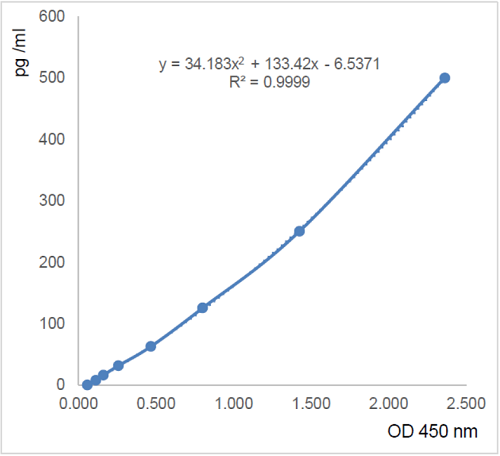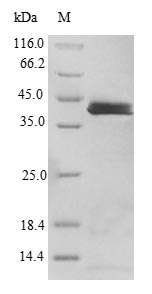IL-36alpha (aa 6-158) (human) (rec.) (untagged)
AG-40B-0165
Protein IDQ9UHA7
Product group Proteins / Signaling Molecules
Overview
- SupplierAdipoGen Life Sciences
- Product NameIL-36alpha (aa 6-158) (human) (rec.) (untagged)
- Delivery Days Customer10
- CertificationResearch Use Only
- Concentration0.1 mg/ml
- Estimated Purity>95%
- Gene ID27179
- Target nameIL36A
- Target descriptioninterleukin 36 alpha
- Target synonymsFIL1, FIL1(EPSILON), FIL1E, IL-1F6, IL1(EPSILON), IL1F6, interleukin-36 alpha, FIL1 epsilon, IL-1 epsilon, IL-1F6 (FIL-1-epsilon), interleukin 1 family, member 6 (epsilon), interleukin-1 epsilon, interleukin-1 family member 6
- Protein IDQ9UHA7
- Protein NameInterleukin-36 alpha
- Scientific DescriptionIL-36alpha (IL-1F6), IL-36beta (IL-1F8) and IL-36gamma (IL-1F9) bind to IL-36R (IL-1Rrp2) and IL-1RAcP, activating similar intracellular signals as IL-1 and are inhibited by IL-36Ra. The expression of IL-36 cytokines has been shown to occur at different sites including the lung and skin and can be derived from diverse cell types including keratinocytes, bronchial epithelium as well as macrophages, monocytes and different T cell subsets. IL-36 family members induce the production of proinflammatory cytokines, including IL-12, IL-1beta, IL-6, TNF-alpha and IL-23 in BMDC and CD4 T cells. Skin and dendritic cells are targets of the IL-36 interleukins leading to a Th1 response. These cytokines may represent potential targets for immune-mediated inflammatory conditions or, alternatively, could be used as adjuvants in vaccination. Recently a novel role for IL-36alpha in the pathogenesis of intestinal inflammation has been reported. - Protein. Human IL-36alpha (aa Lys6-Phe158) is untagged. Source: E. coli. Endotoxin content: 95% (SDS-PAGE). IL-36alpha (IL-1F6), IL-36beta (IL-1F8) and IL-36gamma (IL-1F9) bind to IL-36R (IL-1Rrp2) and IL-1RAcP, activating similar intracellular signals as IL-1 and are inhibited by IL-36Ra. The expression of IL-36 cytokines has been shown to occur at different sites including the lung and skin and can be derived from diverse cell types including keratinocytes, bronchial epithelium as well as macrophages, monocytes and different T cell subsets. IL-36 family members induce the production of proinflammatory cytokines, including IL-12, IL-1beta, IL-6, TNF-alpha and IL-23 in BMDC and CD4 T cells. Skin and dendritic cells are targets of the IL-36 interleukins leading to a Th1 response. These cytokines may represent potential targets for immune-mediated inflammatory conditions or, alternatively, could be used as adjuvants in vaccination. Recently a novel role for IL-36alpha in the pathogenesis of intestinal inflammation has been reported.
- Storage Instruction-20°C,2°C to 8°C
- UNSPSC41116120
- SpeciesHuman




